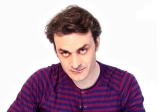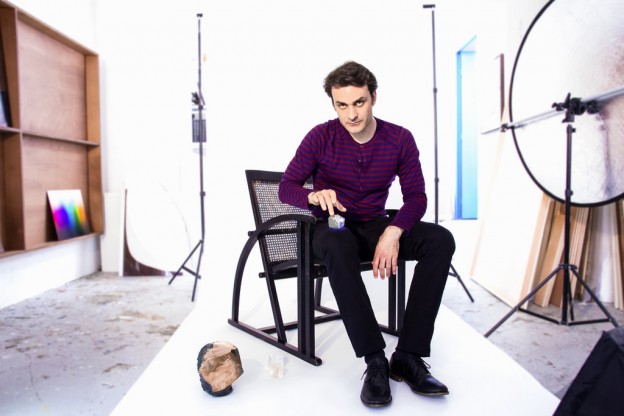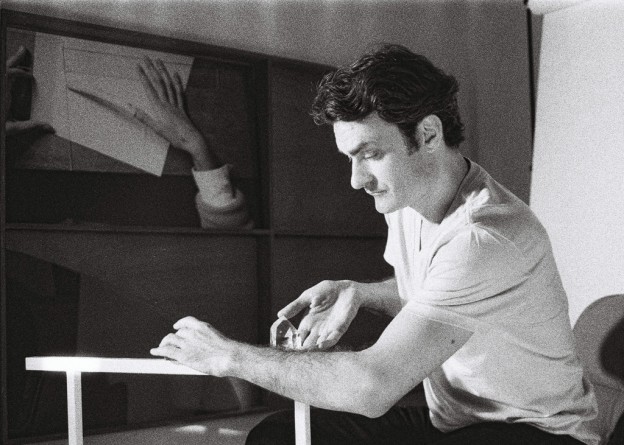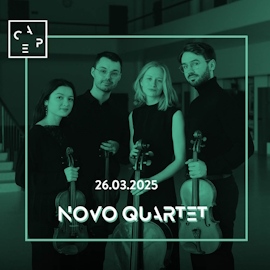This is the english version of the original French text published on November 4, 2015.
The CD review is here
Ivan, how did you first come into contact with music?
I was born into a family of non-musicians, but my parents are great music-lovers. As a family the four of us would drive forty minutes to San Francisco to listen to concerts. Then, during the forty-minute return, we would discuss and share what we had heard. It was an enriching experience!
And how did you come into contact with the piano?
Like many children, I discovered music by listening to my sister practice. She started piano lessons three years before me. I started at age six. I wanted to. I think it was Chopin’s First Piano Concerto that made me want to play the piano.
Then you studied at the University of California at Berkeley. You did a joint major in music and mathematics. Did one discipline dominate the other?
Originally, it was math. No comparison! My interest in math was something that distinguished me from my peers early on. My father studied engineering and took a PhD in physics. Our family is more scientific than artistic. But after a few months at university, I started to skip the math classes to do more and more music. It was a an indication of what was to come. All the same, I successfully finished my mathematics degree.
The math classes were rather austere. Everyone was out for themselves, and there was a lot of competition. Whereas in music, [my peers and I] shared many things. In fact I often learned more from my classmates than from my teachers. In addition, the contact with an audience is obviously quite a unique experience. I think you are either born to be on stage or you’re not. Some people love being on stage; I’m one of them. And people like us, we need it, it’s like a drug.Further, I love the balance between my life on stage and my daily routine, at home: the research, the work, in which, on the other hand, I am introverted, working on repertoire.
What is the importance of mathematics in relation to music?
It’s important on a number of levels. The biggest advantage that I’ve gained from the study of mathematics is that I’m no longer afraid of anything. Mathematics at the university level is not the same as the mathematics you learn at high school. There are very short books, with about a hundred pages at most, and you spend the whole year trying to understand fifty pages, and even then you aren’t sure if you’ve fully understood them. It’s closer to philosophy than anything else.
There are parallels in music. On the first reading of a piece, you only understand only the surface of the music. But to go deeper, repetition is a fundamental tool. Apart from this idea of vanquishing fear or the intimidation of a subject, which I felt with music when I was young, the advantage of mathematics is that it structures your thoughts. You have to find a hierarchy in the ideas. And that’s extremely useful in music. Many of my colleagues have not had access to that kind of education. They are largely guided by their emotions. That can be very limiting.
All the same, listening to you play, your interpretations are not purely intellectual…
That’s true. But I would group myself among those who play with reserve. I find that a little bit of rubato in a less flexible context generates more interest and emotion than music which gives you everything right away, which reveals itself immediately. Personally, that’s less interesting for me on an emotional level. But to play with reserve and to give a little extra grain of salt from time to time, that finesse interests me. That’s what I’m looking for: refinement, subtlety.
After your studies in America, you came to Paris. Why Paris?
I was looking for a challenge. I should say that I was extremely intimidated by Paris, by the French piano school, by the jeu perlé that French pianism is so well-known for abroad. A year before moving to Paris, I applied for a fellowship in California to enable me to study in Europe. I travelled to London, to Vienna, and to Belgrade where I have deep roots. I also travelled to France, to Germany and to Italy. Near the end of the trip I attended the Chopin Festival in Paris. I heard several pianists who were just two or three years older than I was, and their level of playing made a big impression on me. I said to myself: I want to be among these people, I want to immerse myself.
And in Paris, your teachers included Christian Ivaldi, François-René Duchâble and Jacques Rouvier, three very different personalities.
Yes, especally on a musical level. Jacques Rouvier really is really quite an important pedagogue, with more than forty years of experience. François-René Duchâble was teaching very little at the time, he had just decided to put an end to his career. He was sick and tired of the music world but he was very, very funny and his lessons were incredibly generous, and often long: three or four hours at a time. And then there was Christian Ivaldi, who is the most elegant man that I know in music. I was impressed by his way of giving to his students without imposing his own ideas. He knew how to keep his distance, the right distance, to allow each of us to develop as individuals.
And meeting Duchâble, who threw his piano into a lake, led you to develop an interest in an instrument that is not a Steinway, but a Pleyel.
Absolutely! He gave masterclasses in Annecy, in a small private school. Sometimes my lessons went on longer than planned and we would continue at his home. He has a big house and in the living room, there were six pianos. Every time I started a different piece, I went to a different piano. There was an old Bösendorfer, a Pleyel, a Gaveau… The Pleyel dated back to the early 20th century. I played Ravel’s “Valses nobles et sentimentales” on it. It was a revelation! [The idea of] owning several instruments seemed like a great luxury that I promised myself I would attain one day. Today I have a Gaveau and a Pleyel, both of them from 1930, and I totally understand the point of having different types of pianos. The repertoire from that period seems much more logical on a piano from the same period. On a large Steinway, you can quite easily let yourself go and become rough, harsh and violent, while on a 1930 Pleyel, that harshness doesn’t really exist. You can produce a very strong accent and it remains transparent. It’s unbelievable. I keep that sound in my head as a reference point, and even when I play on a Steinway, I seek this smooth, clear quality.
In concert halls, there are almost nothing but modern Steinways…
Yes, that’s true, hence the importance of creating a benchmark sound. It’s tied to my education in mathematics, in which you can fabricate a totally abstract idea and then realize it in practice. Even if I have never actually heard the sound that I imagine, I imagine it all the same, I construct it in great detail, and then, when I sit down at a Steinway somewhere, I do my best to attain this sound.
During your education, you also studied conducting. Will we see you on the podium some day, like so many other pianists?
Well, I have ambivalent feelings about that. I don’t want people to think that I fit into the caricature of pianists who are so arrogant that the piano is not enough for them. On the other hand, I would be curious to try. But, for works more recent than Beethoven, I don’t think it’s advisable. Whenever I listen to recordings by pianists who are also conducting, I always say to myself that it sounds better with a conductor [laughs]. I recently heard a new recording of the Beethoven Violin Concerto by a wonderful French violinist. I respect this person enormously, but the orchestral playing on the recording is totally uninteresting. A conductor is not superfluous; he is there for a reason. I studied conducting a little bit and I am convinced that conductors are essential.
You have won a lot of prizes. Do you believe in the value of music competitions?
They are useful for two reasons: first, they give you an acknowledgment, a kind of encouragement, which is useful for people like me who do not come from a musical background. The fact that I might be recognized by a prize or a good review, or someone might write me an e-mail after a concert, that gives me the strength to continue, to think about and imagine the future. There are lots of extremely talented young people who suddenly shoot to prominence, but, unfortunately, there are very few that last. Now that fewer and fewer people know how to listen and evaluate, it’s important to have a CV full of awards and “accomplishments”. And second, competitions are important for musicians who have trouble evaluating themselves and need an external reference.
Looking at your concert schedule, I would say that you are a ‘recitalist’, more or less.
Yes, absolutely! I love it. Not only as a musician but also as an audience member, I’ve always preferred the intimacy of a recital. I have always been excited and enthusiastic about musicians who know how to create that intimacy, even in a large concert hall. I remember when I was fifteen, I used to listen to Pogorelich in San Francisco, or Jean-Yves Thibaudet, or Evgeny Kissin, often at the back of a concert hall that seated two thousand people. And I felt like I was right beside them, not physically, but musically. A recital is a bewildering journey. It’s such a mysterious process. I am fascinated by this mystery.
A pianist once told me that, for her, the biggest problem is being alone on stage. Do you have this problem too?
No, on the contrary! My solution is extremely simple: you have to listen to the audience. When you play the first piece, you have to listen to the noises in the room. The people in the audience can only choose from the limited range of communication methods that they have available: they can move their chairs, crack the joints in their hands, they can sit up straight, fiddle with their keys, cough a little bit. Within the “rules” of concert etiquette, they can communicate plenty of things.
Admittedly, those things are not explicit, but you feel them anyway. You can feel when the audience is with you, when listeners are intrigued, when they are bored or when they are anxious. In addition, this may have no connection with the music itself. You can play a slow movement and have an anxious public. You can play an extremely virtuoso piece and have a very calm or a very quiet audience. By listening to the audience, you realize what works and what does not.
So I begin a piece, then I listen. And then I change the balance and the tempo. Compared to the rehearsal, the sound in the room has changed, because the audience is there, and they absorb part of the sound, so there’s less resonance. Depending on their reactions, I’ll leave a little more time between pieces so they can settle down. Or, on the other hand, I sometimes surprise them, I sit down and attack the keyboard right away.
Which do you prefer: a large concert hall or a small one?
The ideal size is between 300 and 600 people. With fewer listeners, it’s more difficult, more stressful, it can be a bit suffocating and things can go wrong. And with more than 800, you lose something. There are too many people, the audience is too far away from you and, especially, the concert goers are too far away from each other. Some members of the audience are dozens of meters away, and others are 3 meters away. Of course, there may be people sitting in the back row who are very attentive, as I was when I was young. The problem is that there is no communication between the people in front and those in the back of the concert hall, there is no communion.
You have recorded quite a broad repertoire, ranging from Bach to works from the twentieth century. So you are a pianist who doesn’t specialize?
That’s right! Whenever I release an album that has a bit of success, the reaction is: “This is his specialty”. Two years later, I’ll invariably do something completely different. These days, I still get requests for all-Godowsky concerts, or pieces from other, older projects. I am willing to delve into older projects a little bit, but not for a whole concert. Older projects belong to the past. The most important thing for me is to develop and progress, in order to sustain the desire to continue. For that to happen, I have to be enthusiastic about a subject. I got excited about Godowsky, then I got developed an interest in Morton Feldman, with his abstract music, the complete opposite of Godowsky’s unbridled, wild romanticism.
And now you’ve released a Feldman album. How did you familiarise yourself with this music that you hardly knew?
It took an enormous amount of work, I admit, especially the reading and research. The advantage of the Internet is that you can exchange scores with people all over the world. Thanks to that, I received most of Feldman’s scores in PDF form two weeks after beginning my research. There are also recordings of Feldman. They are wonderful resources. I traveled too. I went to Basel, to the Paul Sacher Foundation. They have manuscripts, Feldman’s correspondence, and rare books. I also found valuable resources at the Médiathèque Musicale Mahler in Paris.
So I did extensive research, because it is part of my desire to immerse myself in everything I can find. And I think that today, in 2015, when we have access to all this information, we have a responsibility. We cannot pretend that the score is everything, that it’s enough. It’s not. To interpret, you have to make decisions, and to make decisions, you have to have reasons. The score does not tell you everything. You find the answers elsewhere. And ultimately, that gives you confidence… which you need on stage. You have to be able to persuade. You have to make the audience understand that you do what you because you know it’s right, not because you just made it up. This is the core of the interpreter’s work: convincing the audience!
Making a recording means selling a recording. How do you convince the public to buy this disc?
The desire to buy this disc will not come from the album cover, nor because of what people know about Feldman. The number of people who worship Feldman, who buy all the available recordings of his music, is quite small. I’m not doing what I’m doing for them and, in fact, I think it’s unfortunate that the cult of Feldman is so insular and hermetic. My approach is the opposite. I want to bring Feldman to everyone, and I hope that in this sense, people will trust me.
More broadly speaking, my goal is for people to trust me so much that if tomorrow I choose a composer they have never heard of, they will say, “I don’t know this composer, so, in principle, I’m not interested. But if Ivan Ilić is playing this music, I’m sure there’s something to it. I’m sure it’s good if Ivan Ilić has spent three years on it.” The time for Feldman’s music has come. It is serene music, abstract, soft, extremely soft. It’s meditative, contemplative; these are things we need today.
Arriving in Paris today, the first thing that struck me was the noise. I had earplugs in my pocket, I put them in immediately. Even with earplugs, I was assaulted by the noise. This is not unique to Paris, it applies to all cities. There is no longer any such thing as a quiet restaurant. If you go to a café, it inevitably has music. Commercial music, obviously. And I think we need the opposite of that. In other words, we need soft music, music which lasts a long time, which requires concentration, real concentration. This doesn’t mean that it’s not emotional, but it certainly is intelligent music. When you listen to it, you’re not doing anything else. You are satisfied and fulfilled by it.
Translation: Richard Lyle McClure























